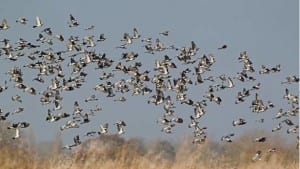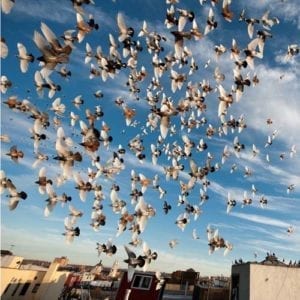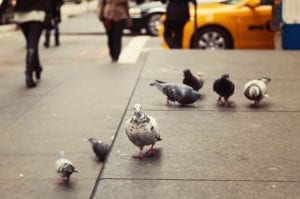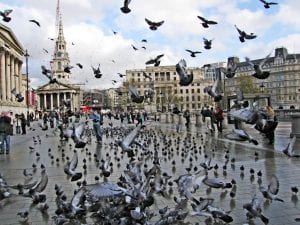
Hunting Pigeon in the Pyrenees — for Supper
 FALL IS WILD GAME SEASON in France, and discerning diners at Parisian outposts like L’Ami Jean, La Régalade and Spring come especially for the composed dishes of just-hunted, rich-tasting game. That one might bite into one’s mallard or grouse and land on stray birdshot is perhaps a badge of honor, proof that what’s on your plate has a woodsier back story than the steak. And palombe, or wood pigeon, has a better back story than most. “As a chef, you want something that tastes delicious, but also that’s coherent and has its own tradition,” says Daniel Rose, who serves it rare-roasted at his First Arrondissement restaurant Spring during the bird’s month-and-a-half season from mid-October to the end of November. Generally grayer than its close cousin, the standard pigeon, with distinctive white marks on its neck and wings, the wild-caught palombe is more delicately gamy and less rich. Rose serves his with braised foie gras and cabbage, and a purée of smoked beet. At L’Ami Jean, Stéphane Jégo goes a more traditional route, roasting the birds with thyme and garlic, or stewed in salmi, a mixture of giblets, wine and foie gras. “Wild palombe brings a rustic, old-fashioned moment to the table,” Rose notes. “It evokes the deliciousness of nature and cooking on an open fire.”
FALL IS WILD GAME SEASON in France, and discerning diners at Parisian outposts like L’Ami Jean, La Régalade and Spring come especially for the composed dishes of just-hunted, rich-tasting game. That one might bite into one’s mallard or grouse and land on stray birdshot is perhaps a badge of honor, proof that what’s on your plate has a woodsier back story than the steak. And palombe, or wood pigeon, has a better back story than most. “As a chef, you want something that tastes delicious, but also that’s coherent and has its own tradition,” says Daniel Rose, who serves it rare-roasted at his First Arrondissement restaurant Spring during the bird’s month-and-a-half season from mid-October to the end of November. Generally grayer than its close cousin, the standard pigeon, with distinctive white marks on its neck and wings, the wild-caught palombe is more delicately gamy and less rich. Rose serves his with braised foie gras and cabbage, and a purée of smoked beet. At L’Ami Jean, Stéphane Jégo goes a more traditional route, roasting the birds with thyme and garlic, or stewed in salmi, a mixture of giblets, wine and foie gras. “Wild palombe brings a rustic, old-fashioned moment to the table,” Rose notes. “It evokes the deliciousness of nature and cooking on an open fire.”
While palombe has always been popular along the west coast of France, its more abundant recent appearances on Parisian menus is in keeping with the contemporary trend, led by the foraging Danish chef René Redzepi, of a re-emergence of back-to the-forest romanticism and a championing of traditional foodways.
On the palombe’s annual migration south — from northeastern Europe through western France and into Spain — there is one spot where hunting the bird has been done the same way for hundreds of years. In the Basque Country straddling the border between France and Spain, the tall peaks and narrow byways of the Pyrenees bottleneck the palombes, making the flocks denser and easier to track. Through the centuries, the annual hunt has become intimately intertwined with local life, in ways that tracking wild boar or deer, which requires isolation and a more masterful skill level, cannot hope to replicate.
Unlike in the rest of France, where villages are emptying out due to urban migration, here, whitewashed split-timber hamlets dot the velvety mountainsides, and close, intergenerational family networks are doing better than most. Every fall, local men of all ages are stricken with what Hervé Etchemendy, who comes from the village of Lecumberry, calls “the blue fever,” taking off work to disperse throughout the peaks of the Pyrenees to hunt. “When October arrives,” he says, “work isn’t too productive. We’re constantly looking to the sky. We’ve all had the fever since we were little.”
THERE ARE two traditional methods of hunting palombe here: with shotguns or with a more complicated, older practice called la chasse au filet, which combines nets, horns and paddles, and has been performed at least since the 16th century and possibly long before that. There are nine net-hunting sites in the Pyrenees, the only region in the world where this type of chasse au filet is practiced, and there will never be more. The number of installations is rigidly controlled by the regional governments, and rights are reserved for lifetime inhabitants of the villages: You have to be born there.
Net setups vary by locale. Etchemendy’s is a compound of three distinct stations up and down the mountainside, and the hunters divide themselves between them. Uppermost are the lookouts, with large white sheets. “Their job is to send the birds down,” says Etchemendy, which they accomplish by vigorously waving the sheets to startle them. They also blow brass horns, to alert the next station a mile downhill. There, in one of six tiny ramshackle cabins perched 50 feet in the air — accessible by a dangerously rickety ladder — the second group awaits. After the horn sounds, they blow loud whistles to alert the next group and simultaneously hurl white wooden paddles, rapid-fire, at the birds. They’re hoping to cause the palombes to lower their flight pattern — enough that when they come to the last station, several hundred yards farther downhill, they will fly into a ring of nets, raised on pulleys. The necks of the birds are then snapped.
Etchemendy and his fellow net hunters choose this method for “the challenge between the birds and man,” he explains, outsmarting nature rather than blasting it into submission.
American hunters will recognize the blasting, and the majority of the hunters in Basque Country do too. This more common practice has its own time-honored rituals. “It’s like a vacation where we rediscover our childhoods,” says Eric Ospital, one of France’s most prestigious charcutiers, who comes from the foothills near Biarritz. “In the same way that we built little cabins when we were kids, only now they’re furnished with stoves and beer and a TV to watch rugby in the afternoon.” Depending on the weather and variations in the palombe’s migratory pattern, “you could wait a week to even see a bird, but it’s not a big deal,” Ospital says. “You’re outside of time.” Jean-François Larramendy, who has brought Ospital and Jégo along to observe on hunting trips, adds, “It’s not about killing,” though of course that happens. “It’s about spending time with friends, boss and worker shoulder to shoulder.”
Every year, Larramendy, the owner of a local bar in the resort town of Anglet, organizes a group of friends from his village of origin, Villefranque, to spend a month in an isolated cabin near the Pic de Béhorléguy. “I started hunting with my father when I was little, and my grandmother used to put big white sheets out on the yard to tell us when it was time to come home,” Larramendy says as we charge up the mountain to a friend’s shack, a former lean-to that is now kitted out with bunk beds, a shower and stove, shelves of aspirin, 70-millimeter cartridges and a massive wood table covered in a plastic cloth, where hunters spend evenings playing mus, a pokerlike game thought to have originated in Spanish Basque Country. The game’s reliance on bluffing makes for especially animated evenings, fueled by multiple glasses of Ricard and water — the amount consumed in inverse proportion to the amount of palombes in the sky. By all accounts, there are fewer passing through the area than there used to be. The local paper had only counted 155,000 two weeks into the season.
When we arrive, it’s overcast and the other hunters, ranging in age from 40 to 84, are mostly focused on their bowls of beef and mutton stew, and making a dent in the many cases of wine they’ve hauled up for the month. Since even under ideal conditions the birds are only visible from sunrise, which takes place around 8 a.m. at this time of year, until midafternoon it’s more about waiting than hunting. The men are identically dressed in camouflage polar fleece, though one, Peio Amestoy, has added a dapper silk foulard tied ascot style and a loden green beret, patting after-shave on his cheeks after freshening up with a straight razor. “Please don’t say that all Basques are savages,” he entreated.
WHAT MOST HUNTERS catch is mainly eaten or shared with friends, though for some it’s a business. There is even one restaurant in French Basque Country that has its own nets. On the afternoon I stop in to the Hôtel Restaurant du Col d’Osquich, its vast dining hall, with old timber beams and a massive hearth, has welcomed several busloads of tourists from Charente-Maritime, several hours north.
The restaurant’s chef, Pantxoa Idiart, trained alongside Stéphane Jégo under the notoriously tough Yves Camdeborde, of the Paris bistro Le Comptoir. He invites us into the kitchen while he prepares our palombe au capucin, roasted bird basted with a cone of flaming pork fat, causing the delicate skin to bubble and crisp up.
Back in the dining room, as it’s delivered to our table, the owner sets up the afternoon’s entertainment. Mounting a chair to approach two tame palombes, each chained to a perch, he bears a glass of water from which they guzzle when he whistles a command. As the cognac and plum brandy are passed around, groups of locals in black berets strike up traditional Basque songs. A table of old ladies next to us sniff dismissively at the spectacle, returning to their game of mus.
About Pigeon Patrol:
Pigeon Patrol Products & Services is the leading manufacturer and distributor of bird deterrent (control) products in Canada. Pigeon Patrol products have solved pest bird problems in industrial, commercial, and residential settings since 2000, by using safe and humane bird deterrents with only bird and animal friendly solutions. At Pigeon Patrol, we manufacture and offer a variety of bird deterrents, ranging from Ultra-flex Bird Spikes with UV protection, Bird Netting, 4-S Gel and the best Ultrasonic and audible sound devices on the market today.
Voted Best Canadian wholesaler for Bird Deterrent products four years in a row.
Contact Info: 1- 877– 4– NO-BIRD (www.pigeonpatrol.ca)


 The ninth annual event will be held at on Nov. 19 at the Eastern Greenwich Civic Center in Old Greenwich.
The ninth annual event will be held at on Nov. 19 at the Eastern Greenwich Civic Center in Old Greenwich.
 Humidifier sterilizers were big sellers back in early 2000s, but Pigeon, a Korean household product maker, refused to manufacture them.
Humidifier sterilizers were big sellers back in early 2000s, but Pigeon, a Korean household product maker, refused to manufacture them.
 Researchers at the University of Ghent have isolated Salmonella Enteritidis phage type 4 (PT4), an important human pathogen, from a population of feral pigeons in Brussels.
Researchers at the University of Ghent have isolated Salmonella Enteritidis phage type 4 (PT4), an important human pathogen, from a population of feral pigeons in Brussels.
 A council is still fighting a long-term war with pigeons over the blight of droppings in the town.
A council is still fighting a long-term war with pigeons over the blight of droppings in the town.